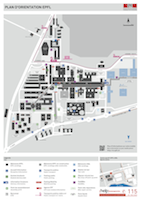Go to
Pierre-Emmanuel Gaillardon
Functionality-Enhanced Devices: An Alternative to Moore’s Law
 Assistant Professor
Assistant Professor
Electrical and Computer Engineering
University of Utah
Salt Lake City, Utah, USA
Friday, 29 September 2017 at 11:00 in room BC 420
Abstract:
In the talk, I will introduce Three-Independent-Gate Field Effect Transistors (TIGFETs), a novel class of computation devices, that can, depending on the bias applied to its gate, achieve different modes of operations usually not achievable in a single device. The demonstrated modes of operations are (i) the dynamic reconfiguration of the device polarity; (ii) the dynamic control of the threshold voltage; and (iii) the dynamic control of the subthreshold slope beyond the thermal limit (with a measured steep slope of 6mV/dec over 5 decades of current). I will show both a silicon-based process route and a 2D approach based on WSe2 crystals. Acutely aware of the need to perform process/design co-optimization, we will review many circuit design opportunities and EDA challenges associated with the technology.
About the speaker:
Pierre-Emmanuel Gaillardon is an assistant professor in the Electrical and Computer Engineering (ECE) department and an adjunct assistant professor in the School of Computing at The University of Utah, Salt Lake City, UT where he leads the Laboratory for NanoIntegrated Systems (LNIS). He holds an Electrical Engineer degree from CPE-Lyon, France (2008), a M.Sc. degree in Electrical Engineering from INSA Lyon, France (2008) and a Ph.D. degree in Electrical Engineering from CEA-LETI, Grenoble, France and the University of Lyon, France (2011). Prior to joining the University of Utah, he was a research associate at the Swiss Federal Institute of Technology (EPFL), Lausanne, Switzerland within the Laboratory of Integrated Systems (Prof. De Micheli) and a visiting research associate at Stanford University, Palo Alto, CA, USA. Previously, he was research assistant at CEA-LETI, Grenoble, France. Prof. Gaillardon is recipient of the C-Innov 2011 best thesis award and the Nanoarch 2012 best paper award. He is an Associate Editor of the IEEE Transactions on Nanotechnology. He has been serving as TPC member for many conferences, including DATE'15-17, DAC'16-17, Nanoarch'12-17, and is reviewer for several journals and funding agencies. He will serve as Topic co-chair “Emerging Technologies for Future Memories” for DATE'18. The research activities and interests of Prof. Gaillardon are currently focused on the development of reconfigurable logic architectures and digital circuits exploiting emerging device technologies and novel EDA techniques.
Secondary navigation
- EPFL Workshop on Logic Synthesis and Emerging Technologies
- Luca Amaru
- Luca Benini
- Giovanni De Micheli
- Srini Devadas
- Antun Domic
- Rolf Drechsler
- Pierre-Emmanuel Gaillardon
- Jie-Hong Roland Jiang
- Akash Kumar
- Shahar Kvatinsky
- Yusuf Leblebici
- Shin-ichi Minato
- Alan Mishchenko
- Vijaykrishnan Narayanan
- Ian O'Connor
- Andre Inacio Reis
- Martin Roetteler
- Julien Ryckaert
- Mathias Soeken
- Christof Teuscher
- Zhiru Zhang
- Symposium on Emerging Trends in Computing
- Layout synthesis: A golden DA topic
- EPFL Workshop on Logic Synthesis & Verification
- Luca Amaru
- Luca Benini
- Robert Brayton
- Maciej Ciesielski
- Valentina Ciriani
- Jovanka Ciric-Vujkovic
- Jason Cong
- Jordi Cortadella
- Giovanni De Micheli
- Antun Domic
- Rolf Drechsler
- Henri Fraisse
- Paolo Ienne
- Viktor Kuncak
- Enrico Macii
- Igor Markov
- Steven M. Nowick
- Tsutomu Sasao
- Alena Simalatsar
- Leon Stok
- Dirk Stroobandt
- Tiziano Villa
- Symposium on Emerging Trends in Electronics
- Raul Camposano
- Anantha Chandrakasan
- Jo De Boeck
- Gerhard Fettweis
- Steve Furber
- Philippe Magarshack
- Takayasu Sakurai
- Alberto Sangiovanni-Vincentelli
- Ken Shepard
- VENUE
- Panel on Circuits in Emerging Nanotechnologies
- Panel on Emerging Methods of Computing
- Panel on The Role of Universities in the Emerging ICT World
- Panel on Design Challenges Ahead
- Panel on Alternative Use of Silicon
- Nano-Bio Technologies for Lab-on-Chip
- Functionality-Enhanced Devices Workshop
- More Moore: Designing Ultra-Complex System-on-Chips
- Design Technologies for a New Era
- Nanotechnology for Health
- Secure Systems Design
- Surface Treatments and Biochip Sensors
- Security/Privacy of IMDs
- Nanosystem Design and Variability
- Past Events Archive
On-Line Registration
Workshop registration is mandatory but free of charge. Please click here to go to the on-line registration form.
Thank you very much for your interest in our workshop. Registration is now closed.
Downloads
Presentation slides:
Venue
All talks will take place at EPFL room BC 420. Please click here to go to the interactive EPFL map.

